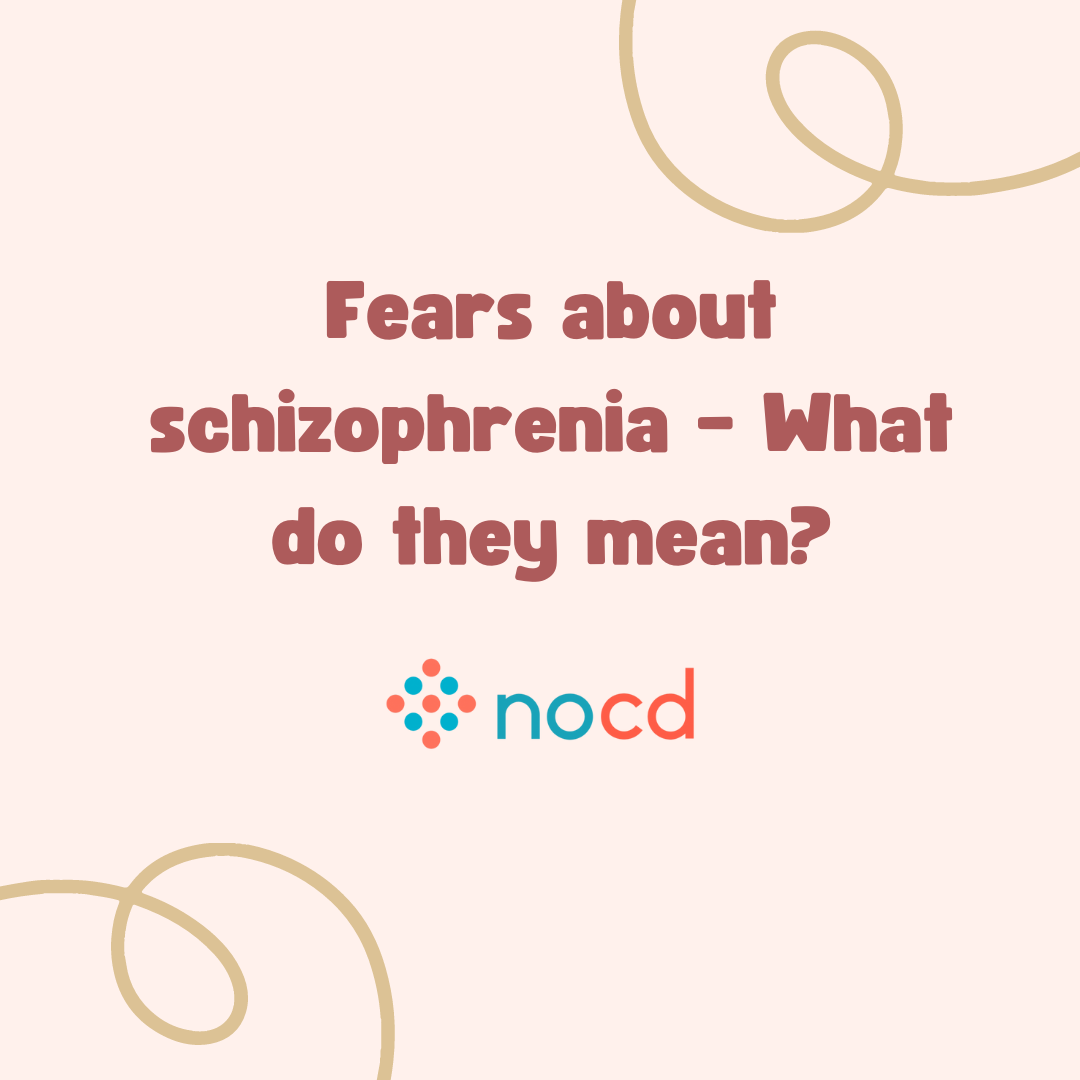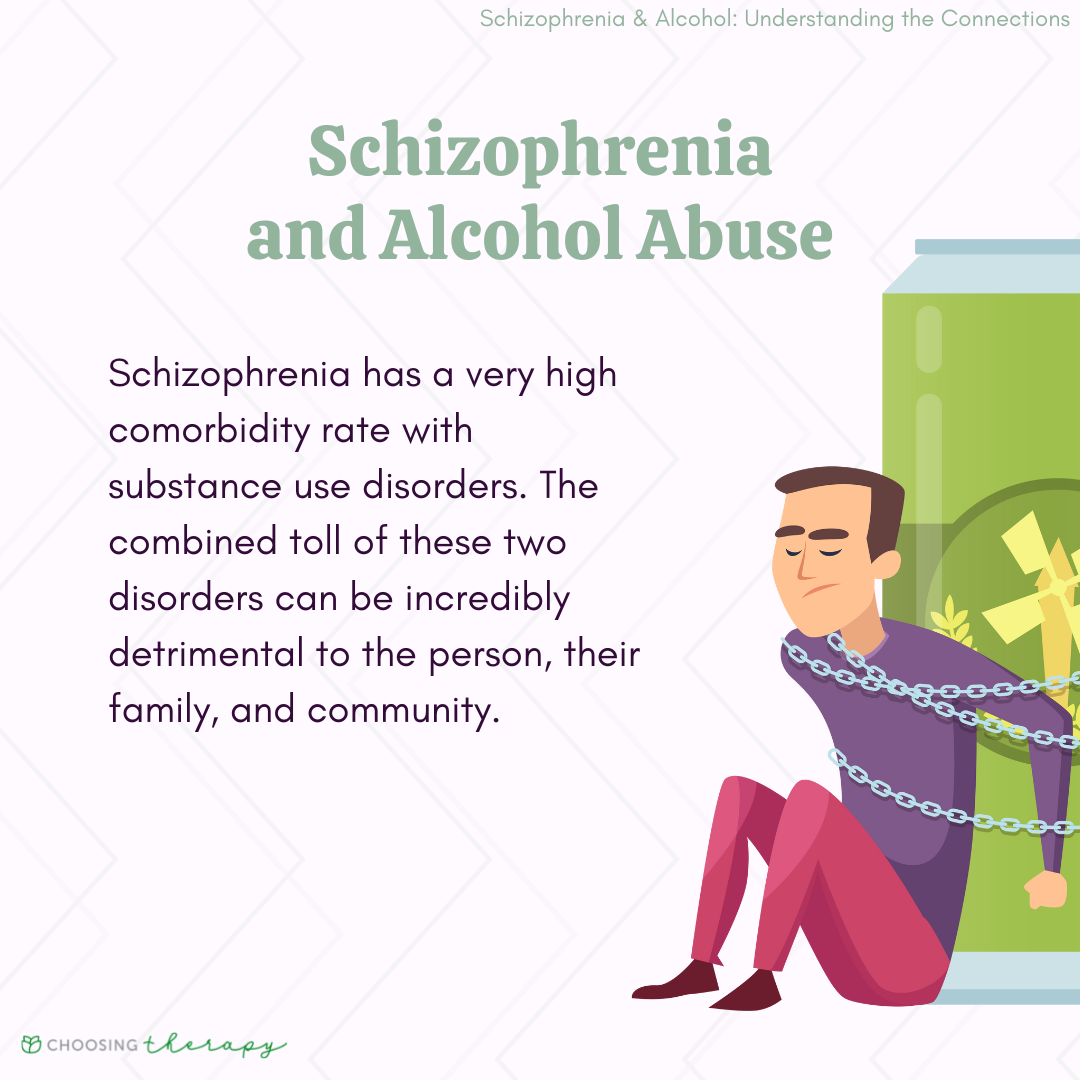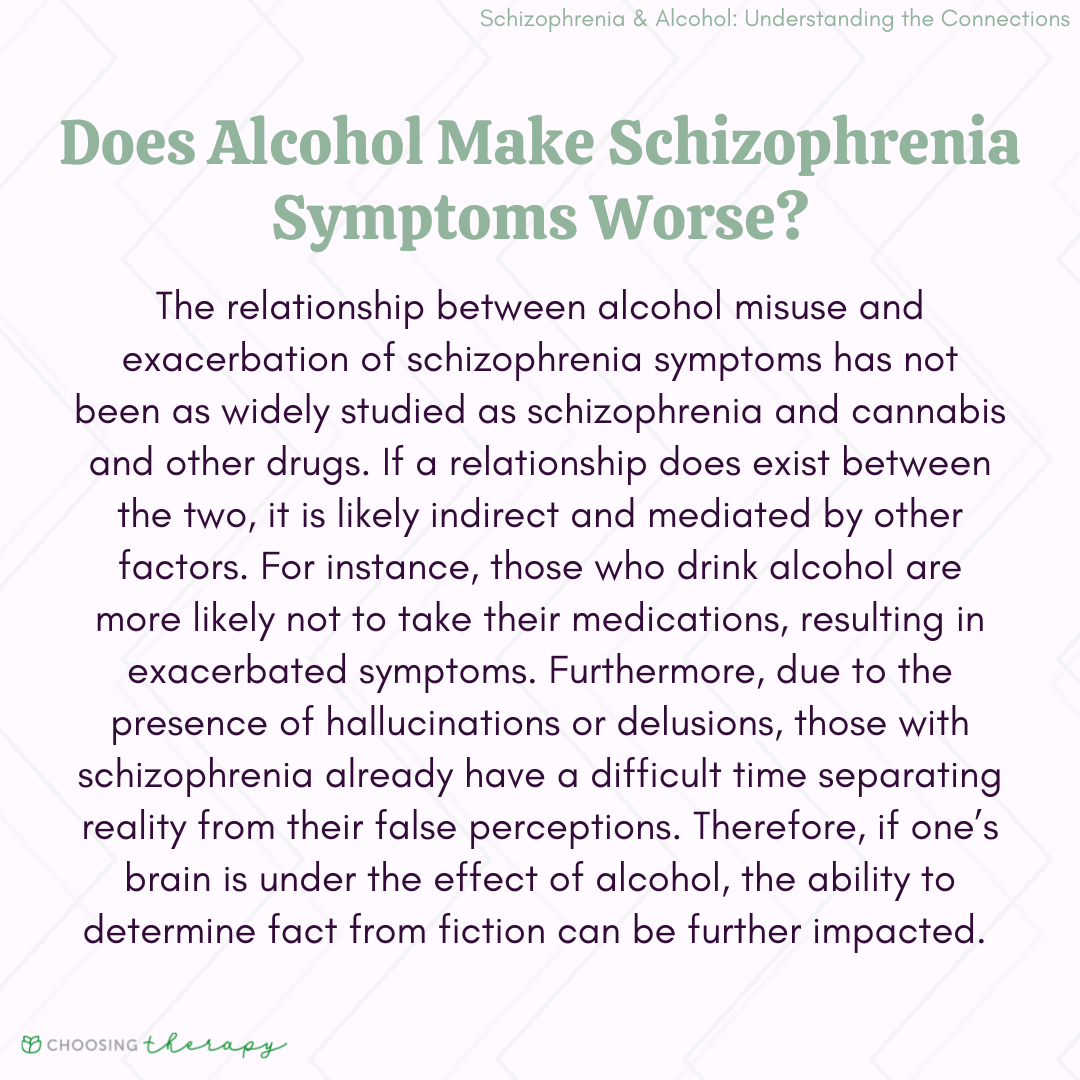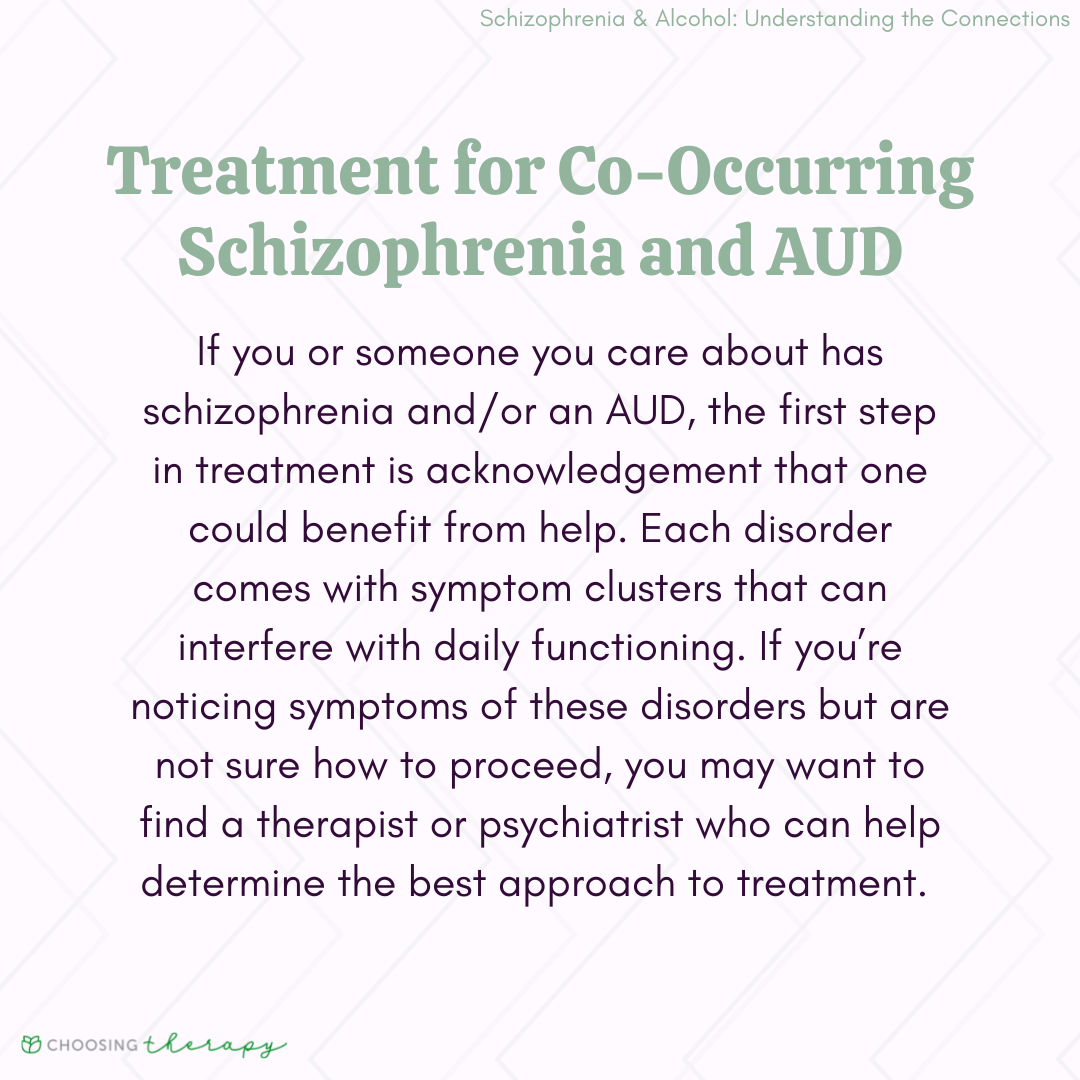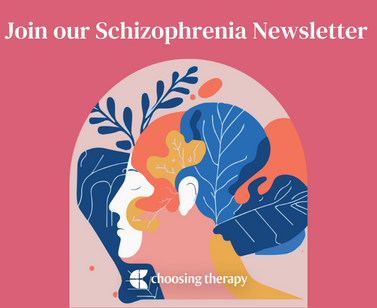
The connection between schizophrenia and alcohol is not completely understood. People with schizophrenia consume alcohol for many of the same reasons as unaffected individuals. However, there are a number of reasons why drinking alcohol may present unique risks for those with schizophrenia. Understanding the risks is important considering the high comorbidity between schizophrenia, alcohol use disorder and other substance-related
Schizophrenia Treatment, Covered by Insurance Grow Therapy enables you to find a psychiatrist or psychiatric nurse practitioner who can diagnose your condition, prescribe appropriate medications, and monitor your reaction to medication. Find A Provider
What Is Schizophrenia?
Schizophrenia is a mental disorder that includes chronic psychotic symptoms such as hallucinations and delusions. Though it occurs in under 1% of the population worldwide, its burden on family and society at large is far-reaching, with the illness being among the top 15 leading causes of disability.1
Usually schizophrenia is diagnosed between late adolescence and early adulthood (upper range of late 20s for males and early 30s for females) with the onset of psychotic symptoms. However, subtle signs and symptoms may emerge earlier in the form of negative and cognitive symptoms.
According to the DSM 5, a person with schizophrenia will exhibit at least two of the first five symptoms (with at least one being a positive symptom) for a period of one month or more:
- Delusions: Distorted beliefs that, despite possibly having a kernel of truth, are not supported by the overwhelming evidence accessible to most other objective, non-psychotic observers.
- Hallucinations: Sensory illusions that can take the form of seeing, hearing or tasting things that aren’t really there.
- Disorganized speech: Speech that does not make logical sense or is incoherent. Speech disturbances may also manifest as a reduction in speech (alogia) or an increase in speech (pressured speech).
- Disorganized behavior: Behavior that does not fit a given situation.
- Negative symptoms: Absence of typical, common or normal features that most individuals regularly exhibit, such as blunted affect (reduced emotional expression), avolition (reduced motivation), and asociality (reduced desire to interact with others).
- Cognitive symptoms: Expert clinicians may use cognitive symptoms (such as verbal fluency and memory impairment) to distinguish schizophrenia from other disorders.
Can Someone With Schizophrenia Drink Alcohol?
It is risky for someone with schizophrenia to drink alcohol for a number of reasons. First, some of the same brain circuits that are dysfunctional in schizophrenia are what put an individual at greater risk for substance dependence and misuse. In fact, rates of heavy alcohol use are three times higher for those with a psychotic disorder than the general population.2
Even though people with schizophrenia report using alcohol for many of the same reasons as neurotypical individuals (e.g., stress relief, to relax, to feel “buzzed”), the risk for misuse is higher. This is due to impairments in decision-making, impulse control, and related executive functioning. Accordingly, it is likely harder for individuals with schizophrenia to inhibit themselves after one or two drinks than a neurotypical person.
Second, alcohol can interact with antipsychotic medications, which can render them ineffective, or even lead to overdose, toxicity, or death.3 Medication compliance is notably difficult with schizophrenia, even without alcohol misuse. Once therapeutic levels of antipsychotics become unstable as a result of excessive alcohol consumption, an acute episode of psychosis can arise that may lead to exacerbation of symptoms and further medication noncompliance. As such, people with schizophrenia who misuse alcohol are more likely to skip their medication than those who do not.4
Schizophrenia & Alcohol Abuse
Schizophrenia has a very high comorbidity rate with substance use disorders (47%). Furthermore, alcohol use disorder (AUD) is experienced by 24.3% – 33.7% of individuals with schizophrenia.4, 5 The combined toll of these two disorders can be incredibly detrimental to the person, their family, and community.
Alcohol is legal, readily available, and relatively inexpensive, which makes it particularly easy to access and use in excess. Unfortunately, individuals with schizophrenia who also misuse alcohol typically have poor medication compliance and tend to live in stressful circumstances that lack support. They are also more likely to be depressed, misuse other substances, become homeless, engage in disruptive behavior, go to jail, or be hospitalized.4
The neurobiology of schizophrenia increases vulnerability to addiction in general. Impairments in impulse control, inhibition, and decision-making are common to schizophrenia. In turn, drinking alcohol in moderation proves more difficult, especially considering that alcohol further exacerbates these deficits. It’s like a double punch to the same area.
Individuals with schizophrenia are safest when practicing alcohol (and drug) abstinence in order to avoid developing dependence or relapsing to alcohol misuse. Those who are diagnosed with both schizophrenia and alcohol use disorder (but can remain abstinent from alcohol use) show fewer psychiatric symptoms, reduced hospitalizations, improved psychosocial stability, and improved quality of life, relative to those who do not remain abstinent.4
Does Alcohol Make Schizophrenia Symptoms Worse?
The relationship between alcohol misuse and exacerbation of schizophrenia symptoms has not been as widely studied as schizophrenia and cannabis and other drugs. If a relationship does exist between the two, it is likely indirect and mediated by other factors.
For instance, those who drink alcohol are more likely not to take their medications, resulting in exacerbated symptoms. Furthermore, due to the presence of hallucinations or delusions, those with schizophrenia already have a difficult time separating reality from their false perceptions. Therefore, if one’s brain is under the effect of alcohol, the ability to determine fact from fiction can be further impacted.
In those with schizophrenia, alcohol misuse increases the risk of heightened:
- Suicidal ideation
- Depression
- Disruptive behavior
- Aggression/violence
- Medication nonadherence
- Misuse of other substances
- Chronic medical problems
- Incarceration
- Legal problems
- Family problems
- Homelessness
- High rates of hospitalization
Alcohol-Related Psychosis
Excessive use of alcohol over an extended period of time can induce psychosis in individuals who do not have schizophrenia. This is called alcohol-related psychosis (aka alcohol-induced psychotic disorder, alcohol hallucinosis). Although it may share certain symptoms with schizophrenia or other primary psychotic disorders, it is different.
Schizophrenia is a chronic, long-term disorder, while alcohol-related psychosis is much briefer, usually resolving within weeks. Sometimes alcohol-induced psychosis can result from alcohol withdrawal as well, and symptoms can include hallucinations (usually auditory but sometimes visual) and delusions (usually persecutory).6 Delirium tremens is another alcohol-related psychotic state specific to acute withdrawal from an alcohol-dependent condition, and this is also distinct from both schizophrenia and alcohol-induced psychotic disorder.
Help For Addiction
Ria Health: Effective, Evidence-Based Alcohol Treatment 100% Online Quickly change your relationship to alcohol with our at-home program. On average, Ria Health members reduce their BAC levels by 50% in 3 months in the program. Services are covered by many major health plans. Visit Ria Health
Workit Health – Online Treatment for Opioids or Alcohol, Including Medication. Modern, personalized recovery that combines medication, a supportive community, and helpful content. Covered by many insurance plans. Currently available in FL, TX, OH, MI, and NJ. Visit Workit Health
Best Drug Addiction Rehab Centers – Find the best local detox or drug rehab center covered by your health insurance. Search by location, condition, insurance, and more. Read reviews. Start Your Search
Can Alcohol Abuse Cause Schizophrenia?
While a direct causal link between alcoholism and schizophrenia is lacking, about ⅓ of individuals with schizophrenia or schizophreniform disorder also meet criteria for an alcohol-use disorder (AUD).4 As such, it seems that both schizophrenia and AUDs may be have similar causal influences, including genetic predispositions to neurological vulnerabilities, and environmental factors like drug use, poverty, physical/sexual abuse, and trauma. However, it is important to note that alcohol misuse cannot directly lead to the onset of clinical schizophrenia. Alcohol use exacerbates dysfunction of certain brain regions and contributes to a vicious cycle of schizophrenia symptoms and alcohol misuse.
Schizophrenia and an alcohol use disorder share similar possible causations including:
Genetics
There seems to be a heritability factor underlying the co-occurring nature of schizophrenia and substance use disorders in general, including AUD.2, 7 Schizophrenia (80-85%) and AUD (40-60%) are highly heritable, and genes that predispose one to impaired functioning of the brain’s dopamine ‘reward circuit’ (mesocorticolimbic system) may underlie both of these conditions.8
Neurological impairments
Impairments in the mesocorticolimbic system, also referred to as the brain’s “reward circuit,” underlie problems with inhibition and impulsivity, motivation, emotion, learning, and memory. Dysfunction of this circuitry (including brain regions such as the prefrontal cortex, hippocampus, amygdala, nucleus accumbens, and ventral tegmentum) and related neurotransmitters (e.g., dopamine, glutamate, serotonin) can lead to many shared symptoms of these disorders. (this sentence is actually what the author should have said above in the “does alcohol use make schizophrenia symptoms worse” section. This sentence is a perfect summary)
Environment
Individuals with schizophrenia and AUD often live in an environment with many stressors (e.g., financial, familial, abuse, etc.), instability, and a poor support network. An individual may recover from alcohol use, but as with many addictions, if the substance is readily available in the home and stressors remain present, the likelihood of relapse is high. While these disorders can affect anyone in any socioeconomic class, the lack of means of financial support can limit support options for the individual.
Signs of Alcohol Misuse in Those With Schizophrenia
If you are concerned that a loved one is experiencing symptoms of schizophrenia, alcohol misuse, or both, encourage them to contact a medical professional or treatment center. Individuals with this dual diagnosis can be less compliant with their psychiatric medications, leading them to be more actively symptomatic, and thus resistant to seeking treatment. As such, a carousel of hospitalizations is common for those in this category.
Warning signs of alcohol misuse in a loved one with schizophrenia include:
- Further decline in self-care
- Reduced motivation
- Inability to enjoy non-substance related things
- Increased aggression and/or violence
- Changes in appetite
- Unusual mood changes
- Medication not taken
- Changes in sleep pattern
- Speech disturbances (slurred, nonsensical, etc.)
- Failure to show up to work or school
- Problems with maintaining relationships
- Disinhibition or disruptive behavior
- Increased depression
Ria Health: Effective, Evidence-Based Alcohol Treatment 100% Online Quickly change your relationship to alcohol with our at-home program. On average, Ria Health members reduce their BAC levels by 50% in 3 months in the program. Services are covered by many major health plans. Visit Ria Health
Treatment for Co-Occurring Schizophrenia & AUD
If you or someone you care about has schizophrenia and/or an AUD, the first step in treatment is acknowledgement that one could benefit from help. Each disorder comes with symptom clusters that can interfere with daily functioning. If you’re noticing symptoms of these disorders but are not sure how to proceed, you may want to find a therapist or psychiatrist who can help determine the best approach to treatment.
In cases of acute severity, hospitalization may be necessary to stabilize the person. Antipsychotic medication or detoxification may help with stabilization, after which a treatment plan can be established. An integrated approach with coordination among clinicians and family, if possible, is ideal in most situations.
Therapy
Treatment for the dual diagnosis of schizophrenia and AUD tends to be integrative and concrete. The plan usually involves equipping the individual (and family, if possible) with strategies to create structure, reduce anxiety, acquire accessible support, establish a relapse prevention plan, and avoid environments that may lead to alcohol use, while participating in positive, low-stress, supportive activities.
Therapeutic options for comorbid schizophrenia and AUD include:
- Individual psychotherapy: Individual therapy, either from a behavioral therapy (BT) or cognitive-behavioral therapy (CBT) perspective may focus on setting concrete goals–like reality testing of hallucinations and delusions, verbal skills enhancement, maintenance of activities of daily living (ADLs), and medication compliance. Insight-oriented therapy may foster a more abstract understanding of the factors contributing to the substance use that trigger one’s psychotic symptoms.
- Family therapy: Family therapy often focuses on the ways an individual’s family system can better prevent the afflicted individual from undue anxiety, frustration or confusion. Additionally, having family members join for doctor and therapy appointments can make a big difference in the treatment outcome as coping strategies work best when relatives are involved.9
- Intensive Outpatient Therapy: Intensive outpatient therapy is an integrative approach that usually provides 9-20 hours of individual and group therapy, skills-training, and other related assistance to help the individual function in their daily life and community.
- Motivational enhancement therapy: As a short-term (4-6 weeks) form of therapy that is particularly effective for treating substance misuse, this approach utilizes motivational interviewing techniques to help a person develop their own awareness, understanding, and intrinsic motivation needed for change and improvement.
- Contingency management: This approach involves reinforcing positive behaviors like abstinence, treatment attendance, and medication adherence with “agreed on, immediate, tangible rewards.”10 It is particularly effective for individuals with a dual diagnosis of schizophrenia and AUD.
- Assertive community treatment (ACT): ACT is a patient-centered treatment that integrates support from an interdisciplinary team including psychotherapists, nurses, doctors, occupational therapists, and peers to help the individuals function within their community.
- Residential programs: For individuals with more severe dual diagnoses, have difficulty with medication adherence, are homeless, or come from poor home environments, a residential program may be beneficial for recovery and support.
Medications
With a dual diagnosis of schizophrenia and AUD, pharmaceutical options are somewhat slimmer than for either condition alone. AUD medications, such as naltrexone, have shown efficacy in reducing both alcohol use and psychotic symptoms11. Acamprosate, disulfiram, and varenicline are also possible treatments, though not many studies have investigated these in dual diagnoses.
First generation or typical antipsychotics are not ideal in this case, as while they might help with the psychotic symptoms, research suggests that alcohol use either remains unchanged or worsens.12 Certain second-generation or atypical antipsychotics, such as Clozapine (Clozaril), have been more useful in treating individuals with schizophrenia and AUD.4
Adherence to a medication regimen is notably poor in both individuals with schizophrenia and substance misuse disorders. Injectable medications have shown to be more effective treatments for individuals with dual diagnoses as they overcome the limitation of adherence. The person’s doctors or support staff will also know if the person is not complying by failure to attend.
12-Step Programs
Twelve-step programs can be a helpful resource for individuals with dual diagnosis of schizophrenia and AUD. Individuals with severe schizophrenia may struggle in group settings focused solely on the single diagnosis of substance use, which is why dual focus groups (e.g., Dual Recovery Anonymous) that are geared towards individuals with both mental health and substance use issues may be more beneficial. Dual focus programs have shown greater success in terms of abstinence, medication adherence, and improved overall functioning than single-focus 12-step programs.
Final Thoughts
Alcohol use disorder (AUD) does not always accompany schizophrenia, but when it does, it can make an already difficult cluster of symptoms even more challenging to overcome. If you or someone you care about is experiencing symptoms of either or both of these disorders, consider seeking clinical support sooner, rather than later. To find resources in your area, ask your doctor or other community members, call a help hotline or use other online resources to find a therapist or treatment facility near you.
Additional Resources
To help our readers take the next step in their mental health journey, Choosing Therapy has partnered with leaders in mental health and wellness. Choosing Therapy is compensated for marketing by the companies included below.
Online Treatment for Opioids or Alcohol, Including Medication.
Workit Health – Modern, personalized recovery that combines medication, a supportive community, and helpful content. Covered by many insurance plans. Currently available in FL, TX, OH, MI, and NJ. Visit Workit Health
Alcohol Treatment – Cut Back or Quit Entirely
Ria Health – Quickly change your relationship to alcohol with our at-home program. On average, members reduce their BAC levels by 50% in 3 months in the program. Services are covered by many major health plans. Visit Ria Health
Drug Addiction Rehab Centers
Recovery.com – Find the best local detox or drug rehab center covered by your health insurance. Search by location, condition, insurance, and more. Read reviews. Start Your Search
Telehealth Treatment For Opioid Use Disorder
Bicycle Health – offers therapy, support, and medication for addiction treatment (MAT). MAT offers the lowest relapse rates for opioid use disorder, helping people to stop using opioids with minimal physical discomfort. Covered by most major insurance. Visit Bicycle Health
Drinking Moderation
Sunnyside – Want to drink less? Sunnyside helps you ease into mindful drinking at your own pace. Think lifestyle change, not a fad diet. Develop new daily routines, so you maintain your new habits for life. Take a 3 Minute Quiz
Fears about schizophrenia – What do they mean? If you’re experiencing unwanted thoughts about losing your mind, becoming psychotic, or developing schizophrenia, it may actually be a sign of OCD more specifically health concern OCD. You might find yourself constantly questioning the state of your mind, which can cause you to be overly focused on feeling different than usual.